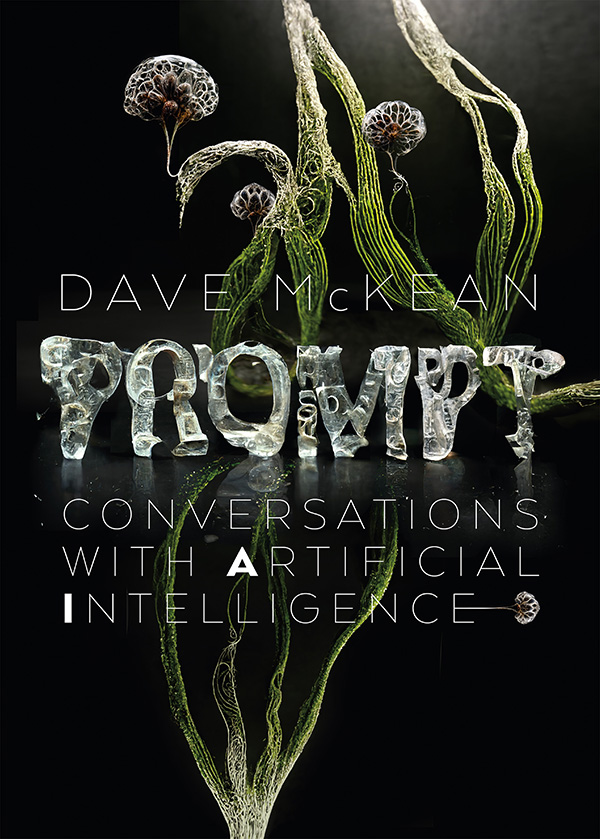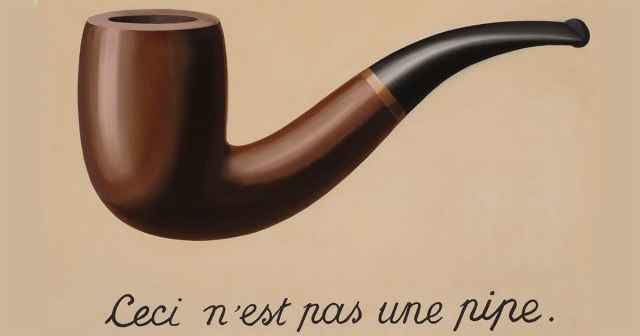
TL;DR
- “Prompt: Conversations With AI” is illustrator and director Dave McKean’s response, in the form of graphic stories, to learning that his work had been fed into AI learning data sets.
- McKean is very concerned about AI’s impact on society at large and its influence on creativity in particular. He believes that effort and process are crucial to making art.
- While he has many problems with how generative AI has been developed and is being used, McKean has and continues to experiment with gen AI as a tool for his work, understanding that it will not be going away in the future but rather become ubiquitous.
Many creatives have been struggling with our feelings about generative artificial intelligence. Illustrator and director Dave McKean went one step further as he grappled with AI: He wrote a 96-page book as he processed how this technology would change his work… and our society.
Prompt: Conversations With AI is McKean’s response, in the form of graphic stories, to learning that his work had been fed into generative AI data sets.
“I’m just an individual human being, trying to make sense, to work out what the hell’s going on, mostly by making marks on paper,” McKean told an audience at Film and Media Exchange, where he was invited to share his thoughts on AI. (Watch the full keynote and Q&A below.)
His initial reaction was along the lines of… not good.
“I did about 10 minutes’ research on what Midjourney was and what artificial intelligence image creation was. And then I spent a day in a fetal position on the floor of my studio,” McKean said.
McKean’s feelings have evolved, but he still maintains strong reservations about AI’s use in creative endeavors.
“I’m very much a critic of this. But a critic who wants to understand it,” McKean said.

AI Explorations and Experiments
After his initial panic, McKean determined he’d need to explore AI’s capabilities, so he began to experiment with Night Cafe, a free tool.
“I fed lines from Roadside Picnic into the bot, and it spat out a few raw materials,” McKean said. But ultimately, he “found it quite hard work to get anything out of it that I liked in any way.”
Later, McKean tried another tack: using it as a shortcut to design an album cover for a friend. “I didn’t really have a firm idea of what it was … so I typed eight words into Midjourney.” He said the image generated “looks like my work, so I used it” and liked it. (His friend’s band ultimately did not.)
However, that initial result also freaked him out and caused McKean to reach out to a neighbor (who happens to be an expert in AI) to understand how the bot was able to recreate his style with such a general prompt. “I just wrote some very bland words in that I thought might put it in a certain kind of image, but I didn’t use my name at all,” McKean recalls. “And she said, ‘Well, it probably knows your IP address.’” (An unsettling idea!)
His next endeavor involved translating the Epic of Gilgamesh into images using AI. He wondered, “Would anything of the story survive that weird conversation?” The end result was that some of the plotlines were discernible to someone unfamiliar with the myth (as tested on McKean’s wife).
McKean also experimented with feeding newspaper headlines into the bot as a way “to see how AI sees us.” He did this over the course of a month, which also happened to be the time frame when Blake Lemoine was fired because he was worried about chatbot sentience, as well as the month of the Uvalde, Texas, massacre.
“All kinds of strange images came out of this,” McKean said.
Strange and at times disturbing. McKean ultimately did not include the AI-generated description of the school shooting, the only image he “censored” from inclusion in the book. “What I took from that is that AI has no feelings to hurt, doesn’t care about hurting our feelings,” he said.
His final experiment was to feed his questions about AI…into the AI. He also included photographs that he’d take on his daily walks (which he’d use to create his AI musings), and created renderings combining the images and questions. After enough re-renderings, “Everything started to look like my work,” he said.
Art Vs. Stuff
McKean thinks that generative AI has created “ethical black holes” that “are obviously really pressing.”
Beyond the legality and issues like copyright, he is concerned about more philosophical aspects, like: “What is the nature now of art and creativity, if all that is happening is somebody’s tapping away?” and “Where do any of us fit into this anymore? And is this the future we want?”
McKean has answered some of these questions, for himself, anyway.
First, he said, “I don’t call it AI art. It’s AI stuff. It’s a great generator of stuff, an endless plane of stuff.”
While that sounds rather derisive, he also admits, “It remains a powerful tool for generating curious and surprising stuff. And that stuff when curated by interesting prompters like my friends, Mario Cavalli, and Ryan Hughes, for example, can be genuinely engaging. It can be used as raw material for further collage or physical media work, and can therefore be part of the creative process.”
He said, “The images that it coughs up are genuinely surprising. And surprise is a big part of creativity. It’s a big part of what we hope to get in our own work.”
Nonetheless, when it comes to creativity, McKean said, “It’s the challenge that’s important. And it’s in the doing of it. And for it not to be easy, and to do things that surprise yourself, and to find things along the way that you would never have discovered about yourself, or about the thing that you end up doing.”
McKean explains, “The AI equivalent of going for a walk is just a teleport to the final destination. Well, that’s not a walk, is it? That gives you nothing of what you want to go on a walk for. It doesn’t get blood pumping, or air in your lungs, or it doesn’t get you — allow you — to try a path that you wouldn’t have come across if you hadn’t gone on that walk or that journey. That’s creativity.”
Even worse, McKean said, “There’s no magic involved with Midjourney. It’s boring and tedious.”
As an artist, he said, “I don’t want to spend my life tapping away on a keyboard. This is so boring. I like making things and getting my hands dirty. So I’ll play with it until I’m bored with it, which is 10 minutes.”
Legal and Ethical Challenges
“Even though I don’t think there’s any chance of returning any or many of the contents to Pandora’s box, I do think the total lack of any forethought on the part of the radical tech fundamentalists has to be called out,” McKean said. “The argument that it is just a tool remains hopelessly naive. It is a tool, but not just a tool. We are racing to keep up with the implications of how it will change society.”
“There are lots of people trying to take these people to court trying to get some sort of opt out, trying to get some sort of royalties paid whenever your name is coughed up. I honestly don’t hold out much hope that things are going to change,” McKean said.
So that means “It’s down to us, again, to form our own ethical boundaries for dealing with this stuff,” he said.
One of his own bright lines is not using AI to copy another creative’s style directly. “Putting a prompt into Midjourney using another artist’s name, as far as I’m concerned, is obviously wrong. I’ve never done it. And I hope none of you have either,” McKean told the audience.
He also scoffs at the idea that AI programmers can’t solve some of the problems we’ve already been presented with.
For example, McKean said, “If it is possible to blockchain an image to prove its ownership no matter what turbulence happens to it online, then it must be possible to watermark AI activity to at least prove beyond doubt, and conspiracy theorists that the photo realistic image of a beloved television news anchor in sexual congress with a koala bear is fiction.”


